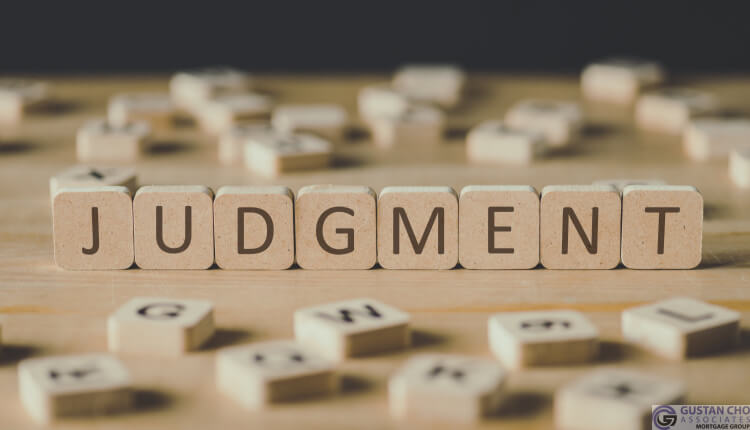In this blog, we will cover and discuss qualifying for FHA loan with judgment and tax liens. One of the frequently asked questions at Gustan Cho Associates is qualifying for FHA loan with judgment. We will be covering the HUD agency mortgage guidelines on qualifying for FHA loan with judgment. The team at Gustan Cho Associates gets many calls and emails by borrowers who want to know the answers to qualifying for FHA loan with judgment. Many borrowers go to their local banks or mortgage brokers and are told that qualifying for FHA Loan With Judgment will be a problem.
Does Judgment Need To Be Paid In Full To Get FHA Loan?
They are often told that the judgment needs to be paid off in order to qualify for an FHA loan. Others are told by banks and lenders that there is a two-year or longer waiting period in qualifying for FHA Loan With Judgment after the date the judgment has been paid off. This is absolutely not the case. Borrowers can qualify for an FHA loan With Judgment. This holds true as long as they have a written payment agreement with the judgment creditor. Need to make three months of timely payments to the judgment creditor. Need to provide three months’ worth of canceled checks which were paid and cashed by the judgment creditor. The borrower cannot pay the three months’ worth of monthly payments all upfront. Need three months of seasoning. In this article, we will discuss and cover Qualifying For FHA Loan With Judgment And Tax Liens.
Qualifying For FHA Loan With Judgment With Written Payment Agreement With Creditor
For example, say a consumer has a $10,000 judgment and has agreed to a written payment agreement with the judgment creditor. They need to make a $100 per month payment until the judgment has been satisfied. Under HUD rules and mortgage lending guidelines, the consumer needs to make three months of the $100 monthly payment per the written payment agreement with the judgment creditor. Cannot pay a $300 check upfront for the three months. This will not count. The consumer needs to make timely payments for a minimum of three months. Whether they pay more than the minimum monthly payment does not matter. But the minimum payment of $100 per month needs to be paid for the next three consecutive months in order for this borrower to meet the qualifying requirements in qualifying for FHA Loan With Judgment.
What Are Judgments?

A judgment is a court order favoring the plaintiff against the defendant. The plaintiff is the party that sues a debtor for a breach of contract or agreement. This is normally monetary and the courts decide whether or not the plaintiff has any merits to the accusation and charges. If the court deems that the debtor does owe money or has breached the contract and/or agreement made between the creditor and debtor, the court will rule in favor of the plaintiff and award a monetary judgment on behalf of the plaintiff.
Does FHA Fequire Judgments To Be Paid Off?
HUD, the parent of FHA, requires judgments to be paid off in full, and/or settled for a negotiated amount. The judgment satisfaction needs to be recorded. Another option you can qualify for FHA loans is for borrowers to have a written payment agreement with the judgment creditor and make payments for at least three months.
Can Judgments Be Negotiated With Creditors To Get FHA Loan?
Judgment is one of the worst derogatory credit items you can have on your credit report. FHA does permit an FHA borrower to qualify for an FHA loan with unpaid outstanding collection accounts without having to pay them. However, qualifying for FHA Loan With Judgment is different. A judgment needs to be addressed. It either needs to be paid off at or prior to closing on an FHA loan. Or a written payment agreement with the judgment creditor needs to be executed and signed and three months’ worth of payment seasoning is required. A judgment will stay on your credit report for seven years from the date the judgment has been entered.
Qualifying For FHA Loan With Judgment After Statute of Limitations Has Expired
In most states, a judgment is good for ten years and it depends on the particular state’s statute of limitations where some states may have a longer statute of limitations than others. Another thing with judgments is that once the statute of limitations period is about to expire in ten years, the judgment creditor can renew the judgment for another ten years after the first ten years is up. Although most judgment creditors will not renew the judgment, the option is there. This holds true if the creditor feels the consumer is judgment proof. Creditors can renew an outstanding judgment. This holds true especially if the judgment creditor thinks that the judgment debtor has hidden assets or will be coming up with assets in the near future.
Can I Qualify For FHA Loan With Collections?
You can qualify for an FHA loan with unpaid collections and charged-off accounts. You do not have to pay outstanding collections and/or charged-off accounts to qualify for an FHA home loan. A frequently asked question at Gustan Cho Associates is why some lenders require all collection accounts to be paid off? The answer to why some mortgage companies require unpaid collections to be paid is because of lender overlays. HUD does not require collections to be paid. But lenders can have their own higher lending requirements and require collection accounts and charge-off accounts to be paid.
Can Collection Accounts Turn Into Judgments?
Outstanding collection accounts do not have to be paid off in order for you to qualify for an FHA loan. However, collection accounts can turn into judgments if the collection agency and/or creditor pursues legal action. So FHA categorizes collection accounts into three categories.
- Non-medical collection accounts
- medical collection accounts
- charge off accounts
Medical collection accounts and charge-off accounts are totally exempt from debt-to-income ratio calculations on their outstanding unpaid collection balance and/or charge-off amount. However, with non-medical collection accounts that have a total of $2,000 of outstanding collection account balances, HUD does require lenders to take 5% of the unpaid outstanding collection account balance.
How Collection Accounts Affect Debt-To-Income Ratios on FHA Loans
HUD requires borrowers with non-medical collection account balances of over $2,000 to have 5% of the outstanding collection balance and be used as a hypothetical monthly debt in DTI calculations by the mortgage underwriter. This is only for non-medical collection accounts. Medical collection accounts and charged-off accounts are exempt from lenders calculating the monthly payment using 5% of the outstanding balance of each collection account. Medical collections and outstanding charged-off accounts are exempt no matter how large the collection account is. The reason the 5% hypothetical debt of the outstanding collection accounts applies is in the event if the collection accounts turn into a judgment which can happen sometimes.
Lenders Must Calculate The Monthly Payment Using 5% of Outstanding Balance of Each Collection Account

The 5% is a hypothetical monthly debt in the debt to income ratio calculations of the borrower is only used for collection accounts that are newer than two years old. Collection accounts older than two years old are exempt. This holds true even though the borrower does not have to pay anything. Borrowers can also enter into a written payment agreement with the collection agency and/or creditor. They can make a monthly payment agreement. That amount can be used in lieu of the 5% of the outstanding collection account balance in the borrower’s debt to income ratio calculations.
Qualifying For FHA Loans With Outstanding Tax Liens
FHA loans are the only loan program that allows borrowers to qualify with tax liens. Fannie Mae and Freddie Mac allow borrowers to qualify for a conventional loan with a written payment agreement but not with a tax lien. Borrowers can qualify for FHA Home Loans with outstanding tax liens. The same guidelines apply to tax liens as do judgments. Borrowers do not have to pay the whole tax lien in full. They need to set up a written payment agreement with the IRS and make three timely payments. Borrowers cannot pay the three months upfront. The three months need to be seasoned for 90 days in order for borrowers to qualify.
Solutions In Qualifying For FHA Loan With Judgment
With judgments, the judgment either needs to be completely paid off or the borrower needs to enter into a written payment agreement with the judgment creditor. Make sure that they have made at least three payments to the judgment creditor. The judgment amount can be settled for less than the full amount as long as they get the judgment release letter. The paid-off judgment needs to be recorded on public records and the credit report reflects the paid-off judgment.
Do Old Judgments Not On Credit Report Need To BE Paid?
Judgments can be good for ten to twenty years depending on the state the judgment was issued. However, credit bureaus will delete judgments that are 7 years old and older. Even though the judgment is not showing on the credit report, mortgage underwriters will find out about the judgment when they run a third party national public records search. All judgments need to be address in order for FHA loan approval.
Can Judgment Be Paid at Closing For Cash-Out Refinance FHA Loans?
Homeowners who are doing an FHA cash-out refinance with a judgment can pay the judgment at closing from their proceeds of the cash-out refinance. The judgment can be paid prior to closing or at the closing of the mortgage loan at the title company. Borrowers with outstanding judgments on credit reports need to qualify for home loans. Borrowers can qualify for VA, Conventional, USDA, or FHA loans with outstanding judgments, contact us at Gustan Cho Associates at 800-900-8569 or text us for a faster response. Or email us at gcho@gustancho.com. I am available 7 days a week, on evenings, weekends, and holidays to take your phone call or emails and answer any questions you may have.
